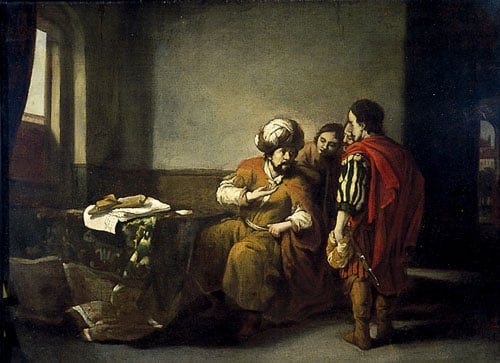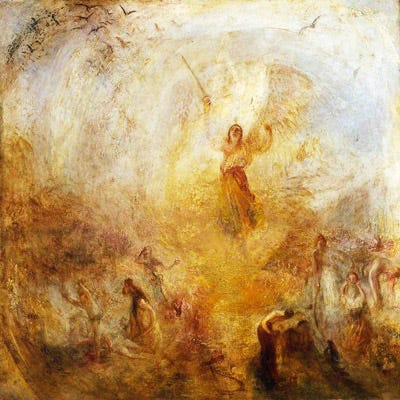Only Human
Some fragmented thoughts on Tim Keller's life and ministry, helping and hurting, irises, and a stirring requiem
Friday, May 26
Grand Rapids, Mich.
Death hits differently in the social-media age.
When Prince died in 2016, a flash flood of grief swept through my Twitter feed. That evening, Tristan had CNN on, and the eulogies came one after another, against a soundtrack of Prince’s greatest hits. “That was a Prince song?” I said repeatedly. I had no idea. It seemed as if an entire society had plunged into mourning, except for me. I felt like a visitor from a faraway planet, encountering a cultural phenomenon for the first time.
Grief itself isn’t necessarily much different nowadays, but the tools with which we can express it are. Everybody has access to a live broadcast medium, which means fewer obstacles to being heard and more possibilities for quick connection. And social media is designed to urge response and goad reaction—the faster the better, the sharper the more click-worthy.
Sometimes that can be beautiful, because it can create solidarity and belonging. Sometimes that can be ugly, because it’s so easy to disseminate misinformation or stoke outrage. Sometimes that can be both/and—particularly at a milestone moment, especially when someone divisive dies. To encounter harsh comments about someone you treasured or to read what you feel is hagiography about someone you feel was harmful—that can sting. And it’s ever so easy to sting back.
Last week, the Presbyterian pastor Tim Keller died from pancreatic cancer. Within hours, my social-media feeds filled with effusive posthumous praise as well as declarations, both from left and right, of all the evil that he’d preached. It was... a lot.
No doubt the responses to Keller’s death were amped up because of his position as a prominent preacher and teacher. Amid all of it, two pieces stood out: First, the religious historian Molly Worthen wrote a concise summary of Keller’s ministry that captures the uniqueness of what Keller tried to do and asks important questions about his ultimate legacy. And then my wise friend Sarah Bessey offered a compelling essay about mourning and grace, the messy reactions to the passing of a public figure and the heightened emotions at the death of a friend:
“Most of us will leave a complicated legacy in the end, even if it’s a quiet one,” Sarah wrote. “For our victories, there are also our sorrows. For our kindnesses, there are our cruelties - intentional or not. For any bit of our wisdom, there is always a record of our foolishness. For those who loved us, there are those who really, really didn’t. For our good choices, there are our ill-advised mistakes. We have all failed to live up to our own ideals. For the good we tried to do, we often caused harm, too. We all carry these complexities, some more publicly than others perhaps, some with more grievous reach and deeper impact.”
I’ve long believed that one of the most audacious things a person can do is to insert himself into another’s relationship with the divine. Even in the tiniest of congregations, ministry comes with incredible responsibility. As the senior minister at Redeemer Presbyterian Church in New York City and as the head of a large church-planting network, Keller’s voice and influence traveled much farther than that of most pastors, even into one of the congregations of my childhood.
During my high-school years in Miami, my family and I attended Immanuel, a congregation belonging to Keller’s denomination, the Presbyterian Church in America, that helped to plant Redeemer. Then, after college, whenever passing through New York City on a Sunday, I’d try to go to Redeemer and hope that Keller was preaching. I liked his sermons. They always made me think.
The season after I moved to New York and came out as gay was my time in a spiritual wilderness. Most Sundays, I didn’t want to be in church. When I did, I’d often pop into Redeemer. Even if I’d wanted a church home then, I knew it couldn’t be Redeemer, certainly not as I lived more fully into who I believe God created me to be. Still, every time I braved the Hunter College auditorium and heard Keller preach, I received some good news. I was then a staff writer at Time, and Keller’s steady invitation to do faithful, honorable work in secular settings helped steady and propel me.
Here’s a complicated thing: I wonder if I would be who I am, both theologically and professionally, were it not for Tim Keller’s preaching and teaching. Nodding to Foucault in The Reason for God, his 2008 best-seller, he wrote that “it is far harder than we think to have a self-identity that doesn’t lead to exclusion.” This was his appeal to identity in our belovedness to God—the only salvation he saw from “inordinate desires for things that control us, that lead us to feel superior and exclude those without them, that fail to satisfy us even when we get them.”
This was something I needed to remember day after day as I did my work, which depended on, even commodified, other people’s stories; the best version of me wanted to tell stories to foster hope and to help us summon our better selves, not to chase awards or magazine covers or the tiny self-satisfaction of a clever kicker. Even more crucially, this is what I hoped to work through as I sought to reconcile my faith with the aspects of my being that marked me as different, including my ethnicity and my sexuality. Would the human affirmation that I craved, the validation that I coveted, give me the satisfaction that I wanted?
Keller invited me to imagine anew how love might show up in the world and to embody hope as it has been embodied to me. Unwittingly, perhaps, his insistence on a robust, thoughtful Reformed faith sent me searching for my own version of that same thing. Eventually, I found myself in the pews of a Reformed congregation that was affirming, across the river in Brooklyn, and through the ministry of that church, I discerned a call to Princeton Theological Seminary.
In 2017, Keller was awarded the Kuyper Prize, which PTS was then hosting. Keller did not affirm women’s ordination or full inclusion of LGBTQ+ people; PTS did. Many of my classmates were befuddled; some were angry, even outraged.
Keller became an avatar for whatever cause, whatever position, with which one was aligned: Conservatives on campus saw him as demeaned, persecuted, and maligned, much as some felt they were. Progressives viewed him as retrograde, even dangerous—a polished, polite voice of the very repression that some had fled. Particularly to queer students and women called to ministry, he represented the powerful forces who had sought to gatekeep them from the pulpit, and here he was, not only invited to speak on campus but also being lauded and praised. (Here’s a piece I wrote in 2017 about the controversy for the Religion News Service.)
Eventually, Keller, the award committee, and the seminary leadership came to an agreement: He would not be awarded the prize, but would still speak on campus. The crowd that gathered spilled out of the auditorium and filled the cafeteria, which had been turned into an overflow space. Most of the audience was polite, but I recall one woman jeering loudly during Keller’s talk.
Amidst the polarized crowd, a few people carved out their own distinct space. After the talk, my friend and classmate Pearl Quick joined the long line to meet him, a small stack of his books in hand. A queer Black woman, she had become a Christian just a couple of years before, and The Reason for God had been vital to her spiritual growth. As she waited, another classmate approached. This woman gave Pearl a long, hard stare and told her that they’d be discussing this later. Pearl was nonplussed.
“Even now, his words still resonate with me,” Pearl told me the other day. But how? I asked. She replied that there was a difference between learning from Keller and letting his views define who she is as a person and as a Christian. “His books gave me something I needed, and I’m grateful,” she said. “Quite honestly, there comes a moment where you know that your life is yours, and to know deeply how God sees you won’t come from a white, straight, cis dood.” (Her spelling, not mine: That’s Pearl.)
Pearl’s ability to parse what was helpful of Keller’s and what was not remains remarkable to me. It seems deeply countercultural, perhaps even in a way that Keller would have appreciated. She managed to see him as a flawed yet still vital teacher. And as we discussed Keller’s legacy, she resisted both the hagiographies that typified his fans’ responses to his death and the philippics that came from his detractors. “As people who walk knowing who and how we love,” she told me, “I think we can understand the harm and also hold the grace, the wisdom, the words.”
He helped people. He hurt people. For some of us, he both helped and hurt.
We want heroes, and we want villains. But I suspect that, in either case, it’s not ultimately about Tim Keller. In many of the responses to his death, I see an almost unconscious ranking of help and hurt, a sort of judgmental jockeying, as if to make the claim: This is what matters more. Alignment with or against him expresses our own longings, our own theological positions, our own wounds, our own desires to matter.
To be clear, this is not to diminish the very real pain, especially that felt by women and by those of us who are queer. I vehemently disagree with Keller’s views on male headship and on sexuality. In churches like his, so many of us have been taught that some God-given aspect of our identities have made us less-than, theological positions that can be soul-destroying and life-shattering. I often think about the queer kids who grow up hearing that their feelings are evil—the leaders of the Presbyterian Church in America last year passed an overture stating that simply identifying as gay, even if one is celibate, disqualifies one from ordination—or the girls who are gifted to preach yet are told that, because of their gender, they can’t be ministers.
To those of us who hold to this more-inclusive vision of the Church, I ask: Does posthumous attack really offers much water to the thirsty or food for the hungry or any lasting balm for the hurting? How about some good news? What if you tell me what you’re for, not what you’re against?
He helped people. He hurt people. For some of us, he both helped and hurt.
I suspect that assessment would neither surprise nor even bother Keller. In his book, Forgive, published just seven months ago, he contemplates the Parable of the Unmerciful Servant, from Matthew: “Perhaps the most shocking part of the story is the callousness of the forgiven servant toward others. How could he fail to be softened and transformed by the king’s mercy?” Keller writes. “As listeners to the story, we can see the incongruity clearly. Yet we who live only by the mercy of God every second of our lives fail to be kind, merciful, generous, gracious, and forgiving every day.”

In other words, he was human. He was someone who did his best, as someone who made mistakes, as someone who helped as well as hurt, as someone who is, like all of us, a blemished yet beloved child of God. And perhaps to see Keller as human is the kindest, most merciful, most gracious thing I can try to do.
What I’m Growing: Some areas on the outskirts of town experienced a frost last night, which was, to put it politely, less than welcome, especially for farmers. But here in the city, we’ve had a stretch of glorious spring days. In our yard, as the tulips have faded, the irises have emerged. A couple of years ago, my mother sent me some iris rhizomes from her yard. I always feel just a bit more pressure when I’m planting something sent by my mom, as if its survival says something about my respect for her. Anyway! These irises didn’t bloom last year—I’ve learned that the first spring after planting might not produce any flowers—but look at them now.
What I’m Listening to: I’ve never been much for praying to saints, so I’ve surprised myself by having Eliza Gilkyson’s Requiem on repeat. Perhaps it’s rationalization, but I’m hearing the words of this stirring song more as a means of identifying with Mary’s humanity and example than a plea for her intervention from on high. In Mary, we have the embodiment of sorrow but also a personification of perseverance and hope.
In funeral fires burning Each flame to your mystery returning In the dark night of the soul Your shattered dreamers, make them whole Oh, Mother Mary, find us where we’ve fallen out of grace Lead us to a higher place
I received a couple of emails in response to my essay last week about place and home and Grand Rapids that chided me—gently, but still—for diminishing the Dutch immigrants to West Michigan and their descendants. One reader suggested that I needed to educate myself better.
These responses intrigued me, because I opted intentionally to decenter the Dutch. In my experience of Grand Rapids, the Dutch influence has been strong—but it isn’t as strong as the stereotypes had led me to believe. And just because their rich threads in the city’s tapestry happen to be shiny and gold doesn’t make them any more valuable in my estimation.
There are ten thousand ways to tell the story of any place. Mine was just one—and just because it didn’t hew to the standard narratives that give primacy to those who have been seen as wielding conventional power and holding traditional wealth doesn’t make it inaccurate.
We’re having some folks over for dinner tonight, so I should really get to the kitchen to make the wonton. But first: How do you feel about my thoughts on Tim Keller? Agree? Disagree? Where do you think I got it wrong? I welcome the conversation, truly. And what else is on your minds this week?
As ever, I’m so grateful we can stumble through all this together, and I’ll try to write again soon.
Yours,
Jeff
An earlier draft of this post contained an error regarding Immanuel Presbyterian Church’s relationship with Redeemer. My apologies for the mistake—and my gratitude to Pastor Al LaCour for the correction.





I really appreciate your perspective in Tim Keller (someone I apparently avoided knowing about until my twitter feed blew up with a wild mix of memoriums). One of the hardest addictions to combat right now seems to be this constant pull towards harsh dichotomy -we’re all demanding full allegiance or full rejection of people, ideas, experiences, even preferences. Most of life is so much more layered, filled with nuance-the beauty even more startling laying beside the rot and banal. I appreciate your recognition of that almost as much as your gentle spirit. Take care!
I appreciate how you emphasize the “both-and” of our humanity. Our brains seek to categorize into good and bad, but our challenge is to hold the tension of the two. We are complex beings but loved beyond measure. Our complexity makes the prospect of grace possible; otherwise, we would somehow assume we earned it. Thanks for a gracious eulogy that held that tension!